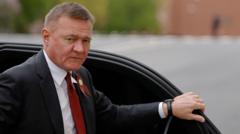In a bold move aimed at enhancing energy independence, the EU seeks to dismantle its long-standing energy ties with Russia, leveraging efficiency and renewable sources.
**EU Unveils Strategy to Phase Out Russian Energy Imports by 2027**

**EU Unveils Strategy to Phase Out Russian Energy Imports by 2027**
The European Commission outlines a comprehensive plan to eliminate reliance on Russian gas, oil, and nuclear materials within the next few years.
The European Commission has taken a significant step forward, releasing a strategic "roadmap" that sets the objective of completely phasing out Russian energy imports, including gas and liquefied natural gas, by the end of 2027. European Commissioner for Energy, Dan Jorgensen, emphasized during a press conference in Strasbourg, "No longer will we allow Russia to manipulate energy supplies against us... We will not be indirect partners in fueling the Kremlin's military ambitions."
In response to the EU's decisive stance, Kremlin spokesperson Dmitry Peskov remarked to Reuters that the EU's strategy could be likened to "shooting itself in the foot." This ambitious plan follows the EU's vow to sever energy ties with Russia, a commitment spurred by the country's military actions in Ukraine since 2022.
Upcoming legislative proposals in June will urge all EU member states to devise "national plans" aimed at eliminating imports of Russian gas, oil, and nuclear-related materials. Jorgensen reiterated the aim of preventing Russia from leveraging energy as a weapon against the EU.
Currently, the EU’s dependence on Russian energy sources has diminished markedly since the onset of the Ukraine conflict, with gas imports from Russia decreasing from 45% in 2021 to roughly 19% today, and oil imports down from 27% to just 3%. However, the bloc continues to source over 14% of its uranium from Russian suppliers, a situation identified as a further economic security risk that needs to be addressed.
While progress has been made in reducing reliance, Jorgensen stressed that "we've come far, but not far enough." The new roadmap aims for a gradual and orderly transition that minimizes disruption to the EU economy. Additional measures are included to counteract Russia’s use of "shadow fleets," which facilitate oil exports while evading sanctions.
In response to the EU's decisive stance, Kremlin spokesperson Dmitry Peskov remarked to Reuters that the EU's strategy could be likened to "shooting itself in the foot." This ambitious plan follows the EU's vow to sever energy ties with Russia, a commitment spurred by the country's military actions in Ukraine since 2022.
Upcoming legislative proposals in June will urge all EU member states to devise "national plans" aimed at eliminating imports of Russian gas, oil, and nuclear-related materials. Jorgensen reiterated the aim of preventing Russia from leveraging energy as a weapon against the EU.
Currently, the EU’s dependence on Russian energy sources has diminished markedly since the onset of the Ukraine conflict, with gas imports from Russia decreasing from 45% in 2021 to roughly 19% today, and oil imports down from 27% to just 3%. However, the bloc continues to source over 14% of its uranium from Russian suppliers, a situation identified as a further economic security risk that needs to be addressed.
While progress has been made in reducing reliance, Jorgensen stressed that "we've come far, but not far enough." The new roadmap aims for a gradual and orderly transition that minimizes disruption to the EU economy. Additional measures are included to counteract Russia’s use of "shadow fleets," which facilitate oil exports while evading sanctions.





















